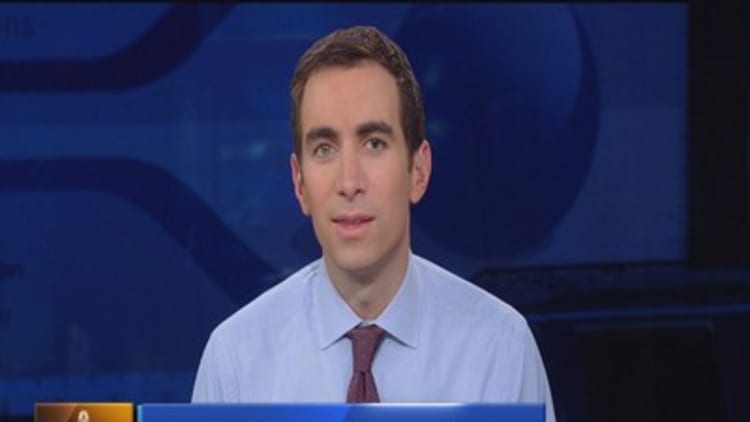
With investors fixated on Thursday's key Federal Reserve FOMC meeting announcement and the prospect of the first interest-rate hike since the Great Recession, the message from a group of CFOs representing more than $2 trillion in market cap is in line with much of the market: Don't hold your breath.
The majority CFO view has moved from betting on a September rate hike when last polled in May to a majority view in the August poll that the first rate hike gets backed up to 2016. Less than a quarter of CNBC Global CFO Council members polled believe the Fed will raise interest rates after its meeting on Thursday (compared to 47 percent in May's poll). In the previous CFO poll, only 16 percent of CFOs were betting on the Fed delaying action until 2016.
Wall Street doesn't think the Fed will announce a rate hike this week, either. The CME FedWatch shows that traders put the probability at only 25 percent, down from 40 percent last month.
Forty-five percent of polled CNBC CFO council members believe a rate hike will come at some point next year. That makes the group more skeptical about Fed hawkishness than traders, who see a 58 percent probability that the Fed does announce a rate hike after its December meeting. Only 28 percent of CFOs think the Fed will move in December (though that moved up from 21 percent in May).
Why are CFOs betting on more delays from the Fed? Simple. It's the economy.
Read MoreFive things to know about the Fed raising interest rates
The CFO council members were marginally more negative on the U.S. economy in the latest poll, with a dip in the number of CFOs who view the U.S. economy as modestly improving, from 58 percent to 56 percent (though that remains the majority view of CFOs). The percentage of CFOs describing the economy as stable or modestly declining both ticked up.
A worsening global view
The much bigger jump, not surprisingly, was in the CFO view of the global economy. Fifty-six percent of CFOs think the global economy is declining, versus only 26 percent in May. In May, 47 percent of CFOs described the global economy as modestly improving—that measure fell to 11 percent in the recent CFO poll.
CFOs are most confident about GDP growth in the U.S. over the next 12 months, while China and Russia are expected to lead global GDP declines. The emerging markets slowdown is clearly on the minds of CFOs, with GDP expectations for the next 12 months led by all the developed nations—the U.S., Japan, the Euro zone and Canada.
Read MoreFed watch: Will volatility return?
While expectations for Chinese growth have come down, China does not rate among the external factors that most concern U.S. CFOs. Consumer demand (18 percent), the dollar strength (19 percent) and U.S. economy (29 percent) remain the external factors that CFOs believe have the biggest impact on their businesses.
Still, CFOs did not seem overly concerned about the U.S. economy when polled in mid-August as the market volatility began to increase. Only 6 percent of CFOs think the S&P 500 will end the year in negative territory, and a majority of CFOs (78 percent) don't believe the government or Fed should take steps to reverse the recent dollar strength and make the currency more competitive globally.
For more from the CFO survey and complete results, click here.
—By CNBC's Anthony Volastro and David Spiegel





